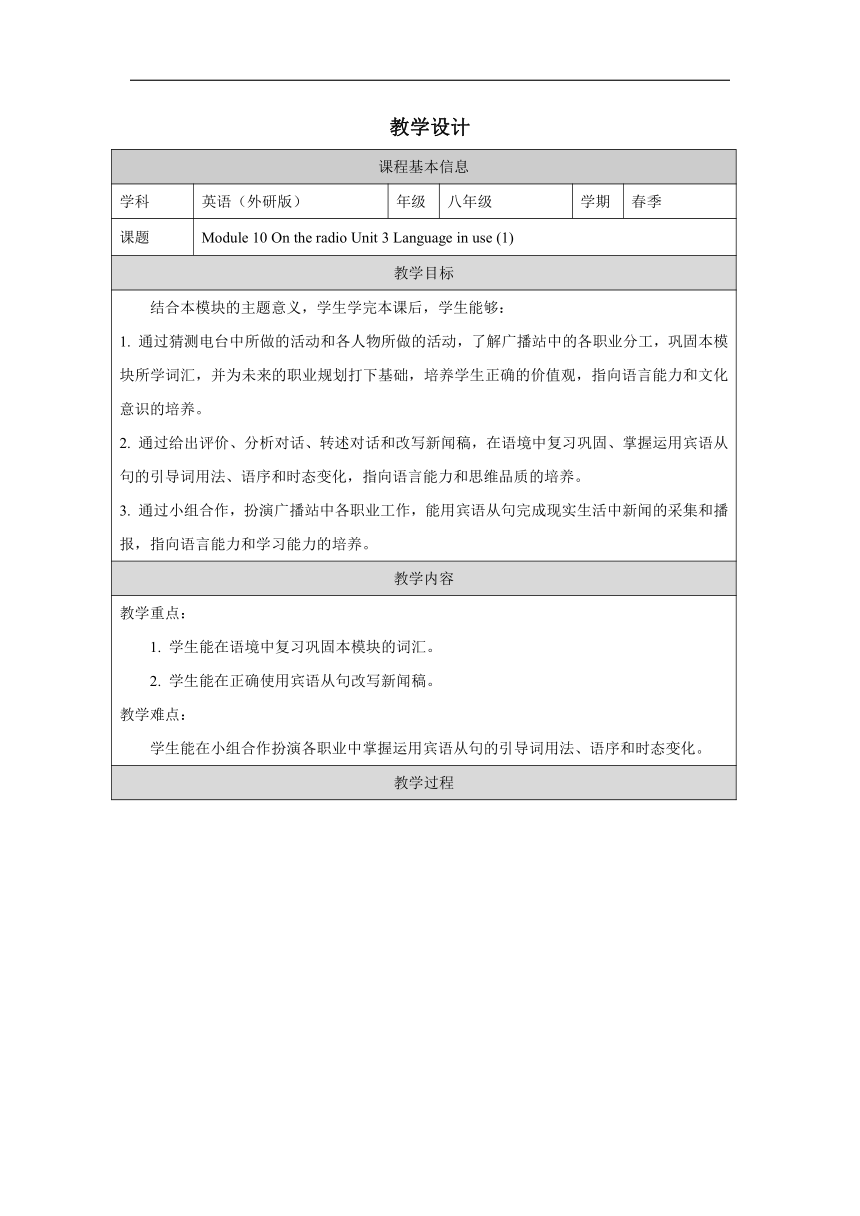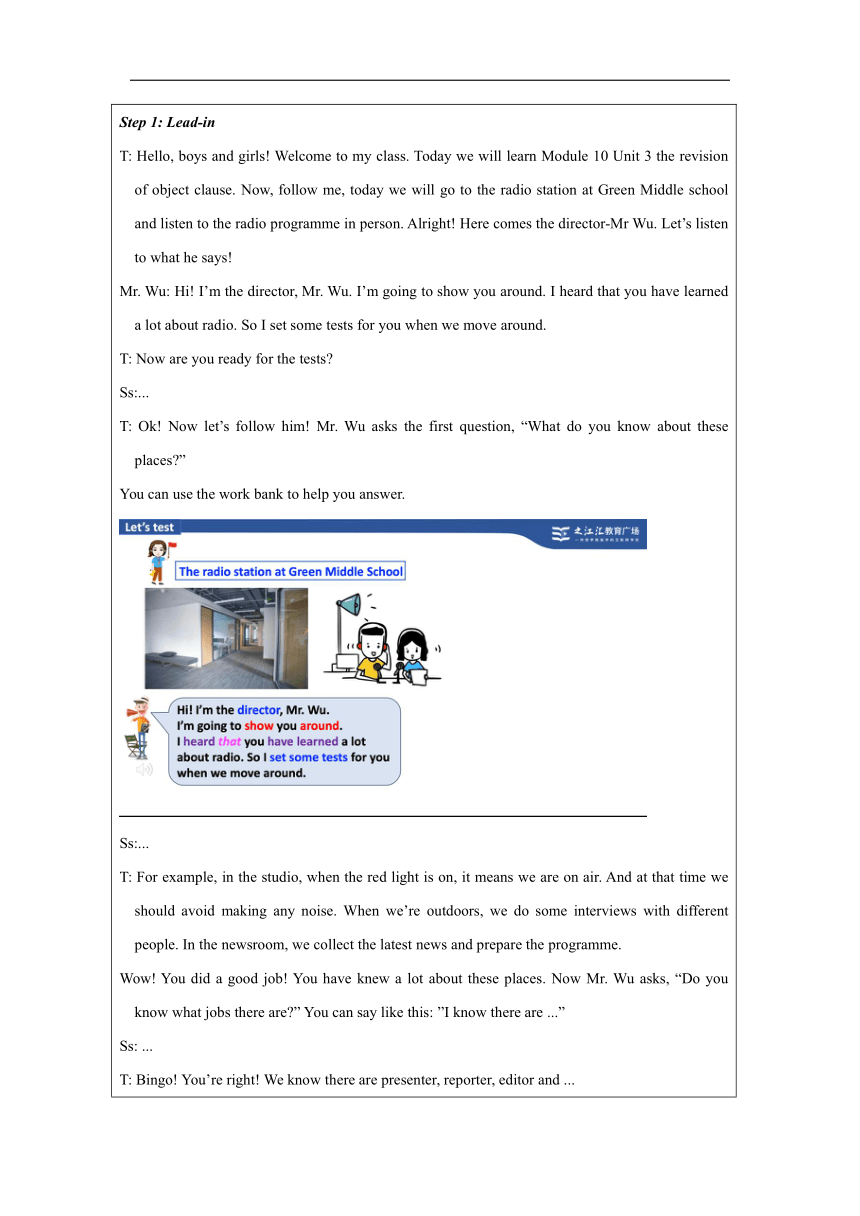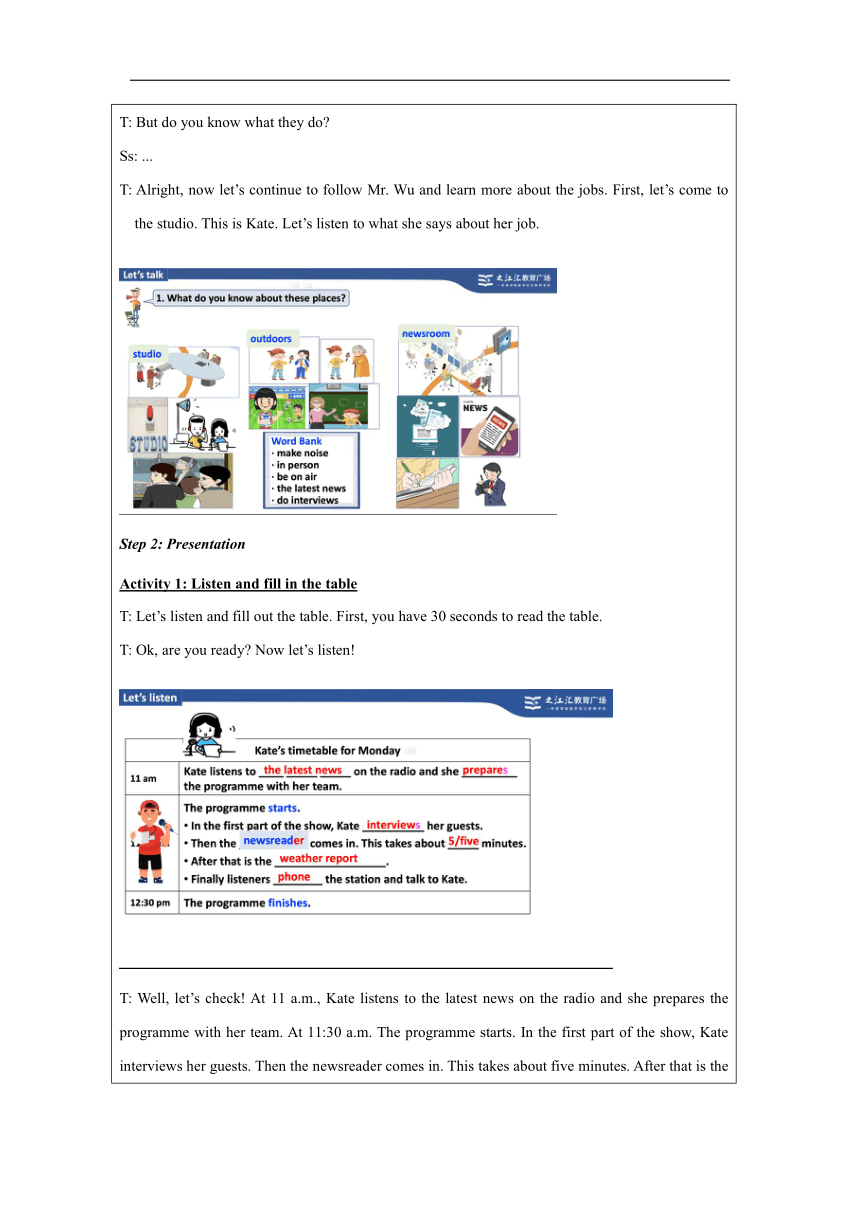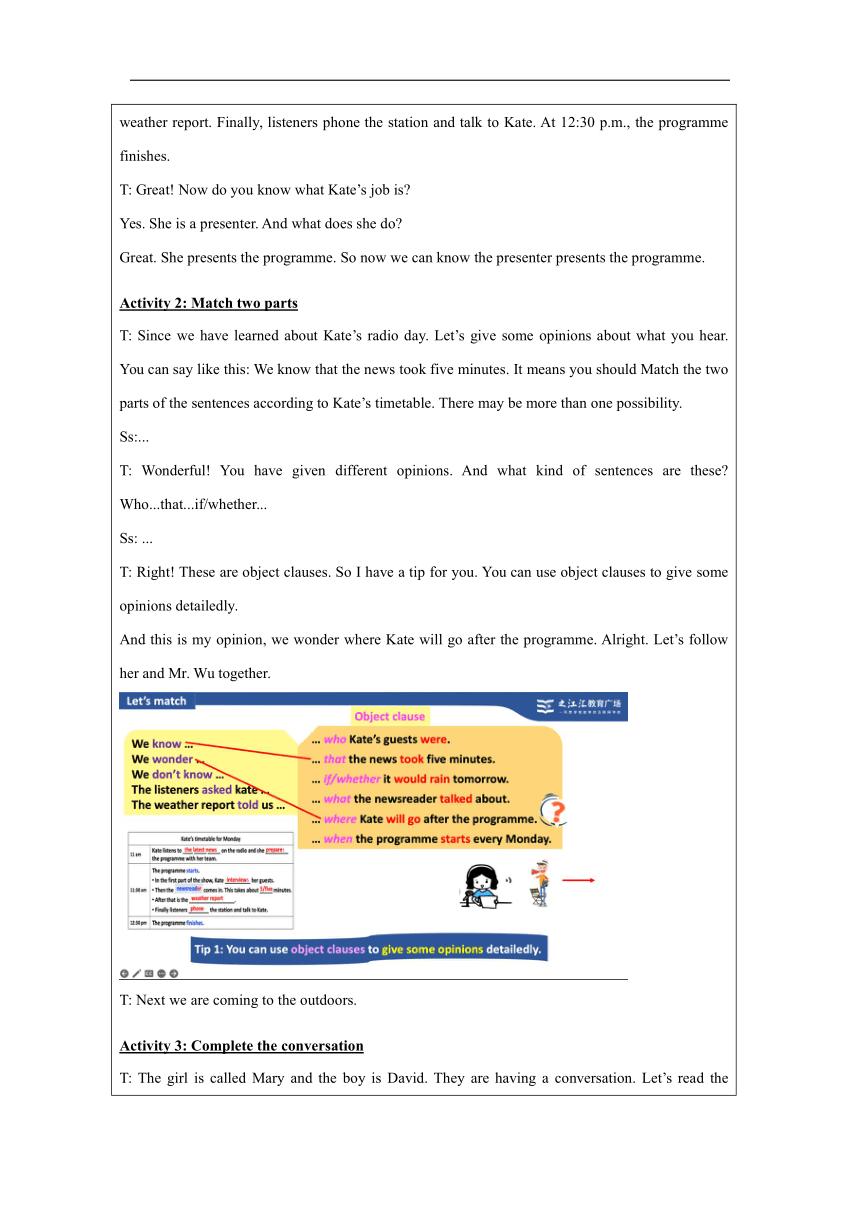外研版八年级下册Module 10 On the radio Unit 3 Language in use 教学设计(表格式)
文档属性
| 名称 | 外研版八年级下册Module 10 On the radio Unit 3 Language in use 教学设计(表格式) |

|
|
| 格式 | docx | ||
| 文件大小 | 1.7MB | ||
| 资源类型 | 教案 | ||
| 版本资源 | 外研版 | ||
| 科目 | 英语 | ||
| 更新时间 | 2024-04-11 18:56:19 | ||
图片预览




文档简介
教学设计
课程基本信息
学科 英语(外研版) 年级 八年级 学期 春季
课题 Module 10 On the radio Unit 3 Language in use (1)
教学目标
结合本模块的主题意义,学生学完本课后,学生能够: 通过猜测电台中所做的活动和各人物所做的活动,了解广播站中的各职业分工,巩固本模块所学词汇,并为未来的职业规划打下基础,培养学生正确的价值观,指向语言能力和文化意识的培养。 通过给出评价、分析对话、转述对话和改写新闻稿,在语境中复习巩固、掌握运用宾语从句的引导词用法、语序和时态变化,指向语言能力和思维品质的培养。 通过小组合作,扮演广播站中各职业工作,能用宾语从句完成现实生活中新闻的采集和播报,指向语言能力和学习能力的培养。
教学内容
教学重点: 学生能在语境中复习巩固本模块的词汇。 学生能在正确使用宾语从句改写新闻稿。
教学难点: 学生能在小组合作扮演各职业中掌握运用宾语从句的引导词用法、语序和时态变化。
教学过程
Step 1: Lead-in T: Hello, boys and girls! Welcome to my class. Today we will learn Module 10 Unit 3 the revision of object clause. Now, follow me, today we will go to the radio station at Green Middle school and listen to the radio programme in person. Alright! Here comes the director-Mr Wu. Let’s listen to what he says! Mr. Wu: Hi! I’m the director, Mr. Wu. I’m going to show you around. I heard that you have learned a lot about radio. So I set some tests for you when we move around. T: Now are you ready for the tests Ss:... T: Ok! Now let’s follow him! Mr. Wu asks the first question, “What do you know about these places ” You can use the work bank to help you answer. Ss:... T: For example, in the studio, when the red light is on, it means we are on air. And at that time we should avoid making any noise. When we’re outdoors, we do some interviews with different people. In the newsroom, we collect the latest news and prepare the programme. Wow! You did a good job! You have knew a lot about these places. Now Mr. Wu asks, “Do you know what jobs there are ” You can say like this: ”I know there are ...” Ss: ... T: Bingo! You’re right! We know there are presenter, reporter, editor and ... T: But do you know what they do Ss: ... T: Alright, now let’s continue to follow Mr. Wu and learn more about the jobs. First, let’s come to the studio. This is Kate. Let’s listen to what she says about her job. Step 2: Presentation Activity 1: Listen and fill in the table T: Let’s listen and fill out the table. First, you have 30 seconds to read the table. T: Ok, are you ready Now let’s listen! T: Well, let’s check! At 11 a.m., Kate listens to the latest news on the radio and she prepares the programme with her team. At 11:30 a.m. The programme starts. In the first part of the show, Kate interviews her guests. Then the newsreader comes in. This takes about five minutes. After that is the weather report. Finally, listeners phone the station and talk to Kate. At 12:30 p.m., the programme finishes. T: Great! Now do you know what Kate’s job is Yes. She is a presenter. And what does she do Great. She presents the programme. So now we can know the presenter presents the programme. Activity 2: Match two parts T: Since we have learned about Kate’s radio day. Let’s give some opinions about what you hear. You can say like this: We know that the news took five minutes. It means you should Match the two parts of the sentences according to Kate’s timetable. There may be more than one possibility. Ss:... T: Wonderful! You have given different opinions. And what kind of sentences are these Who...that...if/whether...
Ss: ...
T: Right! These are object clauses. So I have a tip for you. You can use object clauses to give some opinions detailedly. And this is my opinion, we wonder where Kate will go after the programme. Alright. Let’s follow her and Mr. Wu together. T: Next we are coming to the outdoors. Activity 3: Complete the conversation T: The girl is called Mary and the boy is David. They are having a conversation. Let’s read the conversation and complete it with the given words in the box. Ss: ... T: Now, let’s check together! Now you are David and I’m Mary, let’s read and check your answer. You first, please. T: So from the conversation. What is David’s job Ss: .. T: Right! He is a reporter. And what does he do T: Bingo! He interviews Mary. So now we can know the reporter interviews guests. T: And this boy is Tom. Look! What is he doing Ss: ... T: Right! He is writing a note. And now he comes to the newsroom. Let’s follow him and look at what he writes. So can you guess what is his job Ss: ... T: Exactly! He is an editor. And what does he write Ss: ... T: Yes, it’s a radio script. So we can know the editor writes the radio script. But is this radio script great Does it tell us a piece of news or just repeat the conversation Ss: ... T: Yeah, it just repeats the conversation. It’s not good. So Mr. Wu asks: Can you help Tom to edit it better And here I give you another tip: When you write the radio script, you can use object clauses to relay the interview. Well, let’s edit it by using object clauses according to the conversation. Step 3: Practice Activity 1: Edit the radio script better T: Okay, let’s try together. Finally, we have heard (that) Mary won the English Writing Competition. David asked Mary how she felt. We keep how, here. This is the connective of the object clause. And then we change you to she. So we should also change the person according to the context. Also, we change feel into felt. Why Ss: ... T: Well done. Because the subject clause is past tense. And we need to use past tense, too. Also, let’s compare how do you feel and how she felt. What has changed The word order has changed. So in object clauses, what order should we use The same as the statement. Got it So the order is: subject first, and then the verbs... Great! Go on! Mary said that she was quite surprised. Here, can we drop that Yes! Of course. David can’t understand why Mary thinks/ thought that. So why here we can use thinks or thought Exactly! When the subject clause is present tense, the object clause is any tense we need. Okay, go on! Therefore, David wondered if/whether she had got any other first prizes. And David believed that diligence is the mother of success. But why here we use is The subject clause is past tense, but the object clause is present tense Think about it. Ss: .. T: You got it! The object clause is an old saying, so we must use the present tense. T: Now please help Tom finish the radio script by yourself. And you need to pay attention to the connective, order and tense. Well, try it! Ss: ... T: Well done! Let’s check together. Maybe you can write like this: At last, David questioned if/whether our listeners could read her article. And then, Mary told us where we could find it. David hopes (that) our listeners will learn a lot from it. T: Mr Wu wants you to think, what do you think of Mary You can give your opinion like : I think that Mary ... Ss: .. T: Terrific! I think Mary is modest, also I think Mary works hard or worked hard. So here is the third tip for you: When you write the radio script, you can show your own opinion. Step 4: Production T: Boys and girls, we have already known a lot about the radio. Now Mr.Wu sets a big test for you. Mr. Wu: Now I set a big test for you! I heard that you had an English competition. If one of your group members wins it, please interview him or her and report it at your school radio station. T: Now you can pretend to be the winner or the reporter or the editor or the presenter. The reporter should interview the winner, like this: hello, Hello, listeners! Finally, ... won the English Writing Competition! Congratulations! How do you feel now and then the editor writes down the radio script by using object clause and shows your opinion. At last, the presenter presents the news. Also, all of you should speak loudly and confidently. You can use the checklist to help you. Now you have five minutes to prepare. Time is up. You can role-play with your group members. T: You did a good job! You have passed Mr. Wu’s tests! Here comes today’s homework! All the students should finish this homework. You Must finish and improve your group’s radio script. You must take a video of your group presenting the news with your group member. If you want to be better. You can choose to present your group’s news at your school radio station. T: That’s all for today’s class! Hope you will be a great reporter, or a great editor, or a great presenter. Goodbye.
课程基本信息
学科 英语(外研版) 年级 八年级 学期 春季
课题 Module 10 On the radio Unit 3 Language in use (1)
教学目标
结合本模块的主题意义,学生学完本课后,学生能够: 通过猜测电台中所做的活动和各人物所做的活动,了解广播站中的各职业分工,巩固本模块所学词汇,并为未来的职业规划打下基础,培养学生正确的价值观,指向语言能力和文化意识的培养。 通过给出评价、分析对话、转述对话和改写新闻稿,在语境中复习巩固、掌握运用宾语从句的引导词用法、语序和时态变化,指向语言能力和思维品质的培养。 通过小组合作,扮演广播站中各职业工作,能用宾语从句完成现实生活中新闻的采集和播报,指向语言能力和学习能力的培养。
教学内容
教学重点: 学生能在语境中复习巩固本模块的词汇。 学生能在正确使用宾语从句改写新闻稿。
教学难点: 学生能在小组合作扮演各职业中掌握运用宾语从句的引导词用法、语序和时态变化。
教学过程
Step 1: Lead-in T: Hello, boys and girls! Welcome to my class. Today we will learn Module 10 Unit 3 the revision of object clause. Now, follow me, today we will go to the radio station at Green Middle school and listen to the radio programme in person. Alright! Here comes the director-Mr Wu. Let’s listen to what he says! Mr. Wu: Hi! I’m the director, Mr. Wu. I’m going to show you around. I heard that you have learned a lot about radio. So I set some tests for you when we move around. T: Now are you ready for the tests Ss:... T: Ok! Now let’s follow him! Mr. Wu asks the first question, “What do you know about these places ” You can use the work bank to help you answer. Ss:... T: For example, in the studio, when the red light is on, it means we are on air. And at that time we should avoid making any noise. When we’re outdoors, we do some interviews with different people. In the newsroom, we collect the latest news and prepare the programme. Wow! You did a good job! You have knew a lot about these places. Now Mr. Wu asks, “Do you know what jobs there are ” You can say like this: ”I know there are ...” Ss: ... T: Bingo! You’re right! We know there are presenter, reporter, editor and ... T: But do you know what they do Ss: ... T: Alright, now let’s continue to follow Mr. Wu and learn more about the jobs. First, let’s come to the studio. This is Kate. Let’s listen to what she says about her job. Step 2: Presentation Activity 1: Listen and fill in the table T: Let’s listen and fill out the table. First, you have 30 seconds to read the table. T: Ok, are you ready Now let’s listen! T: Well, let’s check! At 11 a.m., Kate listens to the latest news on the radio and she prepares the programme with her team. At 11:30 a.m. The programme starts. In the first part of the show, Kate interviews her guests. Then the newsreader comes in. This takes about five minutes. After that is the weather report. Finally, listeners phone the station and talk to Kate. At 12:30 p.m., the programme finishes. T: Great! Now do you know what Kate’s job is Yes. She is a presenter. And what does she do Great. She presents the programme. So now we can know the presenter presents the programme. Activity 2: Match two parts T: Since we have learned about Kate’s radio day. Let’s give some opinions about what you hear. You can say like this: We know that the news took five minutes. It means you should Match the two parts of the sentences according to Kate’s timetable. There may be more than one possibility. Ss:... T: Wonderful! You have given different opinions. And what kind of sentences are these Who...that...if/whether...
Ss: ...
T: Right! These are object clauses. So I have a tip for you. You can use object clauses to give some opinions detailedly. And this is my opinion, we wonder where Kate will go after the programme. Alright. Let’s follow her and Mr. Wu together. T: Next we are coming to the outdoors. Activity 3: Complete the conversation T: The girl is called Mary and the boy is David. They are having a conversation. Let’s read the conversation and complete it with the given words in the box. Ss: ... T: Now, let’s check together! Now you are David and I’m Mary, let’s read and check your answer. You first, please. T: So from the conversation. What is David’s job Ss: .. T: Right! He is a reporter. And what does he do T: Bingo! He interviews Mary. So now we can know the reporter interviews guests. T: And this boy is Tom. Look! What is he doing Ss: ... T: Right! He is writing a note. And now he comes to the newsroom. Let’s follow him and look at what he writes. So can you guess what is his job Ss: ... T: Exactly! He is an editor. And what does he write Ss: ... T: Yes, it’s a radio script. So we can know the editor writes the radio script. But is this radio script great Does it tell us a piece of news or just repeat the conversation Ss: ... T: Yeah, it just repeats the conversation. It’s not good. So Mr. Wu asks: Can you help Tom to edit it better And here I give you another tip: When you write the radio script, you can use object clauses to relay the interview. Well, let’s edit it by using object clauses according to the conversation. Step 3: Practice Activity 1: Edit the radio script better T: Okay, let’s try together. Finally, we have heard (that) Mary won the English Writing Competition. David asked Mary how she felt. We keep how, here. This is the connective of the object clause. And then we change you to she. So we should also change the person according to the context. Also, we change feel into felt. Why Ss: ... T: Well done. Because the subject clause is past tense. And we need to use past tense, too. Also, let’s compare how do you feel and how she felt. What has changed The word order has changed. So in object clauses, what order should we use The same as the statement. Got it So the order is: subject first, and then the verbs... Great! Go on! Mary said that she was quite surprised. Here, can we drop that Yes! Of course. David can’t understand why Mary thinks/ thought that. So why here we can use thinks or thought Exactly! When the subject clause is present tense, the object clause is any tense we need. Okay, go on! Therefore, David wondered if/whether she had got any other first prizes. And David believed that diligence is the mother of success. But why here we use is The subject clause is past tense, but the object clause is present tense Think about it. Ss: .. T: You got it! The object clause is an old saying, so we must use the present tense. T: Now please help Tom finish the radio script by yourself. And you need to pay attention to the connective, order and tense. Well, try it! Ss: ... T: Well done! Let’s check together. Maybe you can write like this: At last, David questioned if/whether our listeners could read her article. And then, Mary told us where we could find it. David hopes (that) our listeners will learn a lot from it. T: Mr Wu wants you to think, what do you think of Mary You can give your opinion like : I think that Mary ... Ss: .. T: Terrific! I think Mary is modest, also I think Mary works hard or worked hard. So here is the third tip for you: When you write the radio script, you can show your own opinion. Step 4: Production T: Boys and girls, we have already known a lot about the radio. Now Mr.Wu sets a big test for you. Mr. Wu: Now I set a big test for you! I heard that you had an English competition. If one of your group members wins it, please interview him or her and report it at your school radio station. T: Now you can pretend to be the winner or the reporter or the editor or the presenter. The reporter should interview the winner, like this: hello, Hello, listeners! Finally, ... won the English Writing Competition! Congratulations! How do you feel now and then the editor writes down the radio script by using object clause and shows your opinion. At last, the presenter presents the news. Also, all of you should speak loudly and confidently. You can use the checklist to help you. Now you have five minutes to prepare. Time is up. You can role-play with your group members. T: You did a good job! You have passed Mr. Wu’s tests! Here comes today’s homework! All the students should finish this homework. You Must finish and improve your group’s radio script. You must take a video of your group presenting the news with your group member. If you want to be better. You can choose to present your group’s news at your school radio station. T: That’s all for today’s class! Hope you will be a great reporter, or a great editor, or a great presenter. Goodbye.
同课章节目录
- Module 1 Feelings and impressions
- Unit 1 It smells delicious.
- Unit 2 I feel nervous when I speak Chinese .
- Unit 3 Language in use
- Module 2 Experiences
- Unit 1 I've also entered lots of speaking competi
- Unit 2 They have seen the Pyramids.
- Unit 3 Language in use
- Module 3 Journey to space
- Unit 1 Has it arrived yet?
- Unit 2 We have not found life on any other planet
- Unit 3 Language in use
- Module 4 Seeing the docto
- Unit 1 I haven't done much exercise since I got m
- Unit 2 We have played football for a year now
- Unit 3 Language in use
- Module 5 Cartoons
- Unit 1 It's time to watch a cartoon.
- Unit 2 Tintin has been popular for over eighty yea
- Unit 3 Language in use
- Revision module A
- Module 6 Hobbies
- Unit 1 Do you collect anything ?
- Unit 2 Hobbies can make you grow as a person.
- Unit 3 Language in use
- Module 7 Summer in Los Angeles
- Unit 1 Please write to me and send me some photos
- Unit 2 Fill out a form and come to learn English
- Unit 3 Language in use
- Module 8 Time off
- Unit 1 I can hardly believe we are in the city ce
- Unit 2 We thought somebody was moving about
- Unit 3 Language in use
- Module 9 Friendship
- Unit 1 Could I ask if you've mentioned this to he
- Unit 2 I believe that the world is what you think
- Unit 3 Language in use
- Module 10 On the radio
- Unit 1 I hope that you can join us one day
- Unit 2 It seemed that they were speaking to me in
- Unit 3 Language in use
- Revision module B
